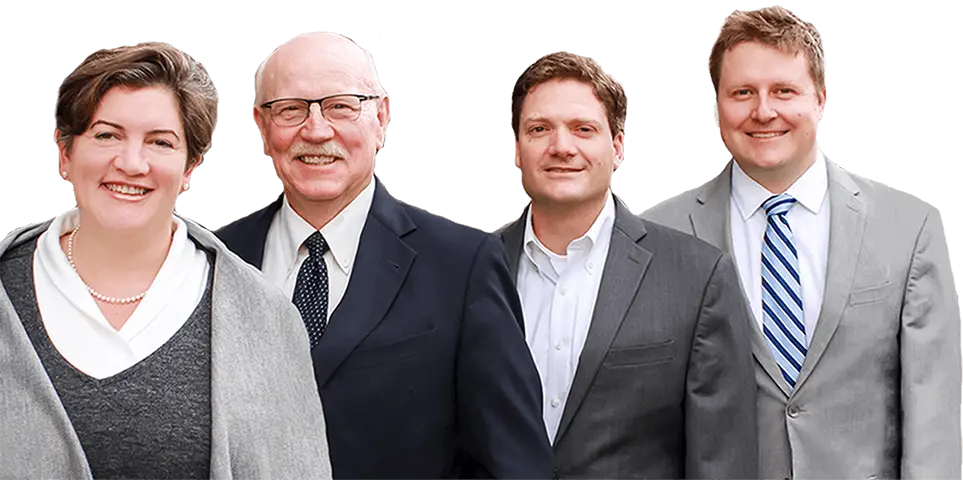Committed Sexual Abuse Lawyers in Washington State
If you have been impacted by sexual abuse, you may be able to seek justice. Contact the sexual abuse lawyers in Washington State at Brett McCandlis Brown & Conner today.
When you or a loved one falls victim to sexual abuse, everything changes. Simple things are terrifyingly complex and you’re left trying to piece everything together. Perhaps you’re finding it much harder to trust, to love, and to accept yourself. Perhaps you’re wondering how you can fix it, or if any of this can even be fixed in the first place.
Well as understanding and dedicated Washington sexual abuse lawyers, we’re here to tell you that, while the recovery process is long and sometimes painfully slow, you can recover. We see our clients – fellow victims – recover often, and their bravery never ceases to amaze us.
Sexual Abuse Is Much More Common Than We Realize
First of all, let us reiterate that you’re not alone in this – neither legally or otherwise. Everyday, hundreds of people are sexually assaulted or abused in the U.S. alone. According to reporting from the National Sexual Violence Resource Center, it’s estimated that a staggering one in three women and one in six men experience some form of sexual contact or assault during their lifetimes. Nationally, about 321,500 individuals over the age of 12 are sexually abused in some way annually. These numbers simply have to change.
As more investigation is being done on the nature of sexual abuse and its perpetrators, researchers now understand more about this horrendous criminal behavior than ever before. Psychologically, it’s suggested that sexual abuse is less about the actual sexual behavior involved in a violent crime, but rather more about an expression of dominance or power over someone else. For this reason, among so many others, sexual abuse of any kind is absolutely inexcusable. Victims must seek justice, and perpetrators must pay for their actions. Get in touch with the compassionate yet determined Washington sexual abuse lawyers at our law firm.
Frequently Asked Questions (FAQs)
What Is Considered Sexual Abuse?
Sexual abuse in Washington is considered as such when one individual is subjected to sexual contact or any behavior of a sexual nature without consent. Sexual abuse can happen using tactics such as the following:
- Manipulation or falsification of information
- Bribery, threat, or coercion
- Physical force, which is all too common
While most sexual abuse cases may include these factors, this list is not comprehensive. Your case may include one or more other elements, which is why you should always consult with experienced Washington State sexual abuse attorneys with questions about your specific case.
What Is 'Consent?'
According to RCW 9A.44.010, the State of Washington defines consent as: “at the time of the act of sexual intercourse or sexual contact there are actual words or conduct indicating freely given agreement to have sexual intercourse or sexual contact.” Therefore, consent has not been (and cannot be) given if the following factors are involved:
- Use of threats, violence, pressure and coercion, or manipulation in any manner
- Absence of clarity of mind or reasoning due to use of alcohol, drugs, unconsciousness, or a state of sleep
- Physical or mental inability to make a decision regarding consent (for example, among persons with disabilities)
- If the individual is under the age of 16
Legal jargon aside, the notion of consent is one that centers around the idea of agreement. In essence, if one party did not or cannot give consent to a sexual activity, it could likely be considered sexual abuse.
What Should You Do When You're a Victim?
The first thing that all victims should do when they know or fear that they’ve been sexually abused is call local police or 9-1-1 as soon as possible to seek immediate help and speak with law enforcement. Seek emergency medical help as well, if needed. You can also reach out to the National Sexual Assault Hotline online or by phone at 800-656-HOPE (4673) to find resources specific to Washington State in the immediate aftermath of the abuse.
The initial actions that victims take after the assault(s) can prove not only helpful toward personal recovery, but also essential for seeking justice. As time progresses, having a police report and other documentation are essential for your abuse case.
How Prevalent is Sexual Assault Among Children?
It’s disturbing to think that sexual assault victimization is pervasive even among minors. In fact, it’s estimated that nearly 80 percent of sexual assault instances among women in Washington State took place during childhood. When faced with such a situation, the most important thing is always the safety and well-being of the child. By reporting all instances of abuse to the authorities immediately, it may be possible to prevent further sex crimes from being committed.
Because the sexual assault of minors goes unreported to authorities so often, it’s difficult to say just how damaging pedophilia and the pedophiles who commit these crimes are to our communities. Research tells us that pedophilia is a condition wherein there’s a sexual attraction to children in their pre-pubescent phase, though not all instances of pedophilia as a disorder necessarily lead to the sexual assault of children (if someone suffering from pedophilia does not act on it, for example).
Child sexual assault is also strikingly common among foster children, children who are adopted, and children who are part of foster families. In one very recent court case, H.B.H v. Washington, foster (and later adoptive) parents Scott and Drew Ann Hamrick were found to have been physically, sexually, and psychologically abusing five children placed in their home by the Department of Social and Health Services (DSHS) starting in 1998. From this case, the Washington Supreme Court determined that “the state is responsible for the welfare of children after they’re placed with foster parents, broadening protections for more than 10,000 kids in government custody,” as reported by The Seattle Times.
Due to the especially sensitive nature of sexual assault committed against children, it can be particularly important to solicit the guidance of an attorney to ensure that the victimized children are not exposed to additional psychological trauma when dealing with criminal or civil proceedings against the alleged perpetrator of assault.
How Is Sexual Assault Classified in Washington State?
If you’re the victim of sexual assault in Washington State, rest assured that it’s considered a serious crime. Here, there are four felony sexual assault crimes:
1st Degree Rape (RCW 9A.44.040) involves the use of force by way of deadly weapon, kidnapping, or infliction of severe injury.
2nd Degree Rape (RCW 9a.44.050) involves forced coercion or a reliance on the victim’s physical or mental incapacity.
3rd Degree Rape (RCW 9A.44.060), or “date rape,” involves a lack of consent – the lack of which then being expressed clearly by the victim’s speech or conduct.
Indecent Liberties (RCW 9a.44.100) involves sexual contact by use of force, reliance on the victim’s physical or mental incapacity or disability, or other situations where it’s impossible to express consent.
Though it’s common for sexual assault cases not to be charged by prosecutors (since doing so would lead to the victim testifying – something that may be considered unreliable based on the circumstances of the assault, the age of the victim, and many other factors), it’s possible to resolve cases involving sexual assault without a trial.
In fact, the Washington sexual abuse attorneys at Brett McCandlis Brown & Conner are skilled at resolving sex crimes cases without going to trial. Through the use of expert witnesses, they have been able to protect some clients – particularly children – from testifying entirely. To discuss the specifics of your case, contact them here.
What Is the Statute of Limitations?
While questions involving the statute of limitations can have very complex answers in criminal matters, the statute of limitations for Washington sexual assault cases (that pertain to someone over 14 years old) includes the following, according to RCW 9A.04.080:
- If the assault or abuse is reported to police within one year of the incident, there’s a 10-year statute for prosecution.
- If the abuse is not reported within one year of the incident, then charges can only be pressed against the perpetrator for a maximum of three years following the date of the incident.
In civil cases, the statute of limitations is based on the age of the victim at the time of the offense as well as when the victim discovered (or reasonably should have discovered) that the injury or the condition was caused by the sexual abuse and or sexual assault (RCW 4.16.340). Put another way, a victim of childhood sexual abuse may sue the abuser for damages suffered as a result of the abuse within the later of: (1) three years from the abusive act; (2) three years from the time the victim discovered (or reasonably should have discovered) that an injury or a condition was caused by the abusive act; or (3) three years from the time the victim discovered that the abusive act caused injury for which the claim was brought. No matter what, if you feel that you have been victimized and you are not sure if the statute of limitations applies to you, our highly knowledgeable Washington State sexual abuse lawyers can help determine if you have a viable claim.
Civil Claims and the Statute of Limitations
Depending on the specifics of your situation, a civil lawsuit filed against the perpetrator of a sexual assault case can yield several different types and amounts of compensation. In these claims, the perpetrator can be held responsible for the personal injury inflicted on the victim of the assault. Such personal injury claims can result from many different causes of action, such as an intentional infliction of physical and emotional distress or assault and battery, for example. Generally, the statute of limitations for civil claims is three years from the date of the injury or the discovery of the injury caused by the sexual assault, if tolling is not applicable.
For civil claims involving sexual assault – and particularly where tolling may be at play, where discovery of injury is ambiguous, or where minors are involved – the statute of limitations can become quite complex. To find out if tolling or other factors may affect the statute of limitations in your case, speak to an experienced Washington sexual abuse lawyer today.
Why Should Victims Seek Help?
Even though life after sexual abuse may seem impossible to continue, one of the most important things to do is seek help. The Office on Women’s Health tells us that sexual abuse victims often experience long-term mental, physical, and emotional health effects. These may include:
- Aches and pains
- Sleeping problems
- Anxiety or depression
- Substance dependance
- Exposure to Sexually Transmitted Infections (STIs)
- Pregnancy
- Increased likelihood of self-harm or suicide
While the recovery process may be a long one, seeking out professional counseling, medical advice, and local support groups can mean the difference between returning to your thriving self once again or losing yourself and all aspects of your life due to the horrendous act of another.
Always remember: The hardship you now experience was not caused by any fault on your part.
Speak With a Sexual Abuse Lawyer in Washington State Today
If you or a loved one has been victimized by sexual abuse, the time to act is now. We understand that coming forward and speaking about it must be one of the most frightening aspects of seeking help. But, our Washington sexual abuse lawyers are experts when it comes to seeking justice for our clients while always remaining cognizant of their feelings and sensitive to confidentiality. There are much too many victims of sexual abuse living among us, trying to carry on normal lives, while their attackers take theirs for granted. It’s time for that to end – for good.
If you’re ready to speak to us about your situation, we’re ready and willing to listen. We are here and we’re ready to seek justice for victims of sexual abuse that were no fault of their own. Please, reach out to us now so we can help you continue the healing process. Contact us today.
Other Areas We Provide Help in
The attorneys at Brett McCandlis Brown & Conner have been helping those who fall victim to misfortunes – tragedies of all kinds like car accidents, wrongful death of a family member, defective drugs, and much more – for many years. We live and work in this community and our entire concern is that our clients and neighborhoods are safe for folks like us to live and thrive. Whenever injustices happen that prevent this, it’s our personal mission to see that we help to restore, recover, and legally rectify whatever we can for those involved. It’s our personal and professional aim, and we’re quite successful at doing just that.
We Expertly Help Victims in All the Following Areas
Car accidents: Car accidents are the most common accidents that result in personal injury lawsuits. Car accidents can be caused by a variety of things, but they often leave their victims with physical and financial scars for years to come.
Drunk driving accidents: Beyond just car accidents, drunk driving accidents cause unjust damage and can change a victim’s life forever. Often, a criminal conviction punishes a drunk driver, but the victim may never receive compensation for damages. Fortunately, it is also possible to sue a drunk driver, which can sometimes be better for victims of these accidents.
Wrongful death: Wrongful death is the term for when an injury victim dies as a result of someone else’s wrongful conduct. Damages can be comparable to those given after a catastrophic personal injury case and is often divided among close relatives. Many different acts of negligence can lead to a wrongful death lawsuit.
Bicycle accidents: A bicyclist is nearly invisible to many drivers who are not expecting to see a bicycle on the road. As such, many traffic accidents involving bicycles are actually caused by the motorist, not the bicyclist, though he or she is often the one who suffers more from the accident.
Motorcycle accidents: Motorcyclists are just as vulnerable as bicyclists – only, vulnerable at much higher speeds. Even when a rider takes proper safety precautions, death or serious personal injury can still happen. In fact, serious injury can occur even when another driver doesn’t make physical contact with a motorcyclist (e.g., running an operator off the road).
Trucking accidents: When an 18-wheeler truck loses control, it’s especially dangerous. Unlike your average driver, truckers are closely monitored and regulated; therefore, a regulatory violation can assist with personal injury or wrongful death claims resulting from an accident.
Defective drugs: Generally, three categories of drug defects lead to a product liability lawsuit: design defect, manufacturing defect, and failure to warn of any significant dangers. Of all personal injury lawsuits, product liability lawsuits are one of the easiest to win.
Other types of accidents: Just about all types of injuries could involve a personal injury lawsuit if the injury was caused by someone else’s misconduct. You might be able to sue a bar, for example, if their bouncer unjustly attacked you, or sue a grocery store for failure to clean a slippery floor.
Please contact us. We have successfully sought out justice and damages for victims of terrible accidents that were no fault of their own. Call our law office to discuss your situation today.


